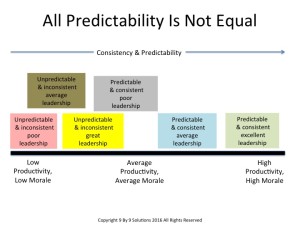Transparency is often defined as the responsibility of the leader to make information, data and even thinking available to employees. But there is another aspect of transparency that is important, possibly more important than sharing information. That additional factor deals with future transparency, the ability of employees to read the leader, also known as predictability.
There is much discussion in leadership circles about resistance to change and the stress that change has on the workplace. The concern is how can leaders change the organization without “burning people up”. Just as in the old fable that ended with the moral, “the little foxes spoil the vine”, so the greatest amount of change and stress is probably not from major company initiated projects but from the day-to-day inconsistency and unpredictability leadership behaviors.
The Research
Research published in the Academy of Management Journal (February 9, 2016) reported that employees are less stressed and have more job satisfaction when their bosses are always unfair than when their boss is unpredictable. While somewhat counterintuitive, we all know this to be true from our personal lives. Friends and acquaintances that exhibit mercurial personalities and behaviors are often draining and exhausting while those who are more stable allow a longer and more productive relationship.
In the experiment, college students were asked to estimate a hypothetical company’s stock price using information about its performance. The students — whose heart rates were being monitored during the experiment to test their stress levels — were divided into three groups. A third consistently got feedback such as “thanks for your effort during the last round” or “it’s great to work with a motivated person.” A third repeatedly heard things like “all I can say is that I wish I was working with someone else” or “it sucks to work with an unmotivated person.” Another third heard of a mixture of the two. To no one’s surprise, those who got consistently positive feedback fared best when it came to the heart rate monitoring. Those who consistently heard negative or even derogatory feedback did better than those who sometimes heard compliments and sometimes were criticized.
A second study involved 100 workers in a range of companies and industries who completed daily surveys over a three-week period about their perceptions of fairness. Their corresponding supervisors were also surveyed at the beginning of the study to measure their capability for self-control. Again, employees who had unpredictable managers were more likely to be stressed; dissatisfied with their jobs and emotionally exhausted than those who said they were always treated unfairly.
https://www.washingtonpost.com/news/on-leadership/wp/2016/03/02/the-worst-kind-of-boss-is-not-the-one-whos-always-a-jerk//
The study concluded that “Contrary to the intuitive notion that more fairness is always better, our work shows that being treated consistently unfairly can be better for employees than being treated fairly sometimes and unfairly other times.” http://amj.aom.org/content/early/2016/02/09/amj.2014.0455.abstract
Predictability at Google
This research parallels the findings of Google concerning the most important characteristic of leaders. Google found that the more predictable and consistent a leader is, day in and day out, the better. This leader removes unnecessary distraction and changes that impact employees. When employees are freed from this external distraction (dare I say drama?) they are more able to focus attention on their work. (Has anyone ever noticed that often offices run better when the leader is absent? This occurs because unnecessary distractions) that leaders seem to love to create are removed).
Fadel Matta, a researcher at Michigan State University and the lead author of the paper said ” It’s better if supervisors are a consistent jerk than if they’re fair sometimes and not fair other times. People want to know what they can expect when they come into work.” https://www.washingtonpost.com/news/on-leadership/wp/2016/03/02/the-worst-kind-of-boss-is-not-the-one-whos-always-a-jerk/
Leadership Predictability and Success
This of course in no way undervalues excellent leadership practices. Not all predictability is created equal. Organizational climates vary widely depending in what types of skills are practices consistently.
Implications for Leadership
One additional finding from the Academy of Management Journal provides significant impact to how we select leaders. “Finally, we showed that supervisors with more self-control tended to be less variable in their fair treatment over time.” http://amj.aom.org/content/early/2016/02/09/amj.2014.0455.abstract
One of the most important selection criteria for future leaders will be the person’s self-control. High performers who vacillate in their ability to work with people or who are inconsistent in their behaviors, including dependability or even the desire to be involved in other’s work, may not make the best leaders regardless of their technical capabilities.
Copyright 9 By 9 Solutions 2016 All Rights Reserved
